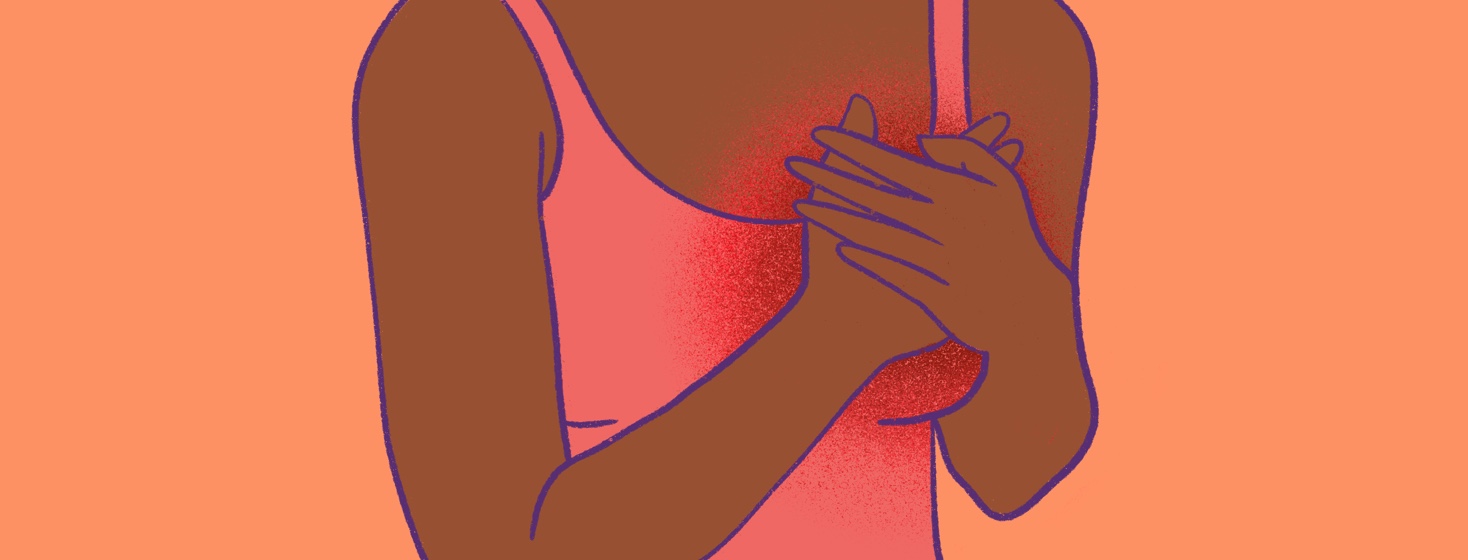What is Inflammatory Breast Cancer?
Inflammatory breast cancer (IBC) is rare and aggressive. The symptoms of IBC are different from most other types of breast cancer. There is usually no lump that forms. Instead, breast tissue may look red and swollen, and you may see changes in skin texture. IBC may not be seen on a mammogram. By the time most are diagnosed, IBC has already metastasized.1
Many genes are involved in the development of breast cancers like IBC. Hormone receptor (HR) and human epidermal growth factor receptor 2 (HER2) are 2 such genes. Doctors refer to genes as positive, meaning they are active, or negative, meaning they are inactive. The different combinations of positive and negative HR and HER2 genes are called subtypes.2-3
Breast cancers have different subtypes. A recent study found that subtypes influence cancer metastasis. Preferences for certain metastasis sites were found in different subtypes. Knowing your subtype may help doctors determine your best treatment options.1-2
Know the symptoms of IBC
Most diagnosed with IBC do not feel lumps in the breast. The breast tissue becomes red, swollen, and warm to the touch. The skin texture may change, and your breast may feel heavy or hardened. It may feel and look like the peel of an orange. The nipple may look smaller or inverted.1,4
Symptoms may start and worsen quickly. IBC looks like an infection so it is easy to misdiagnose. By the time most people are diagnosed, the cancer has metastasized. This means it has spread from the breast to other organs.4-5
What causes IBC?
Cancer forms when genes cause DNA to change. The DNA then makes abnormal cancer cells. These cells get stuck in the breast ducts. This causes the classic infection-like symptoms of IBC.1
How common is IBC?
Only 2 to 4 percent of breast cancers are IBC. IBC spreads quickly and can come back post-treatment. IBC has worse outcomes when compared to other types of breast cancer. Ten percent of all breast cancer deaths come from IBC.6
Know the risk factors of IBC
The following factors can raise your risk for IBC:1,4,7
- Gender – more women than men get IBC.
- Race – more African Americans get IBC compared to Caucasians.
- Being overweight – IBC is more common in those who are overweight.
- Age – the average age for diagnosis of IBC is 5 years below the average age of diagnosis for other breast cancers. The average age of diagnosis for African Americans is 52 while in Caucasians is 57.
- BRCA1/2 status – if you have mutations in genes linked to other types of breast cancers, it may raise your risk for IBC.
Understanding the genetics of IBC
If you are diagnosed with IBC, your doctor may talk about the following genes and their activity levels:3
- Estrogen receptor-positive (ER+) – the cancer cells bind and respond to the hormone estrogen.
- Progesterone receptor-positive (PR+) – the cancer cells bind and respond to the hormone progesterone.
ER+ and PR+ subtypes are often classified as hormone receptor-positive (HR+). An HR+ subtype can be either ER+/PR-, ER-/PR+, or ER+/PR+. An HR- subtype is ER-/PR-. Another subtype is called triple-negative which is ER-/PR-/HER2-, but it may be written as HR-/HER2-. A triple-positive is ER+/PR+/HER2+.3
Treatments for IBC
IBC treatments are different from the way other types of breast cancers are treated. You may get hormone or HER2 therapies, but chemotherapy and radiation are common. Doctors may suggest surgery as the first line of treatment for other types of breast cancers. Surgery is not an initial treatment of IBC.1
Other factors of breast cancer
A few known genes of interest are discussed here, but more genes could be involved in IBC. Some breast cancers, like IBC, can also be hereditary. Know your family history. Get regular checkups, and see your doctor for any concerns. As with any cancer, early detection is key.

Join the conversation